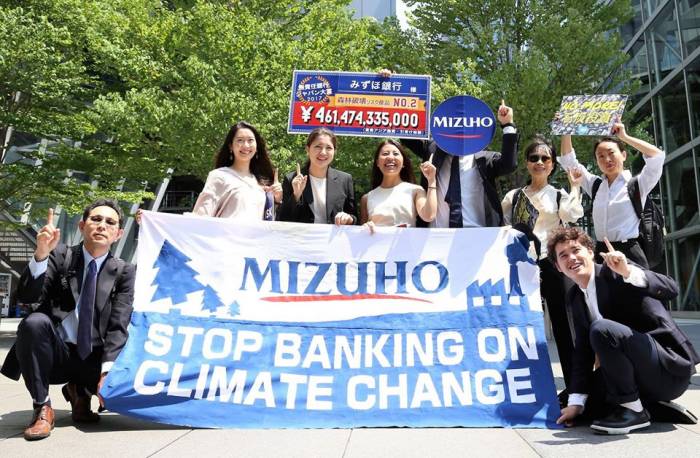Press Release
16 April, 2020
350.org Japan
Mizuho, World’s 9th Largest Fossil Fuel Financier Restricts Coal Financing
Huge Loopholes and Still Far Behind Its International Peers
Huge Loopholes and Still Far Behind Its International Peers

Tokyo, Japan – Mizuho Financial Group (Mizuho) announced its new policy on coal financing on April 15 (JST), drawing a bittersweet reception from climate activists across Asia. Mixed reactions on this announcement come hot on the heels of Japan’s recent announcement of its updated Nationally Determined Contributions (NDC), which received huge protests by the Japanese public.
Takayoshi Yokoyama, 350.org’s Japan Representative said:
“We are glad to see the announcement by Mizuho that it will not provide financing or investment that will be used for the construction of new coal-fired power plants. Mizuho’s move to tighten its climate policy is a needed response to the growing voices of environmental groups, young people in Japan and investors. However, Mizuho’s policy revision remains a partial response to solving the climate crisis, and inconsistent with the 1.5 degrees Paris Climate goal.”
Upon adopting the UN Principles for Responsible Banking (PRB) in 2019, Mizuho is bound to align its business strategy with the Paris Agreement and Sustainable Development Goals (SDGs). Construction of new fossil fuel-related infrastructures is a violation of the Paris Agreement.
In this respect, it is a great concern that Mizuho’s new policy allows exceptions and will come into effect from June 2020, which may allow the bank to finance the controversial coal-fired power project, Vung Ang 2 in Vietnam (total project cost estimated at USD$2.2 billion). JBIC as well as the four Japanese commercial banks (Mizuho, Mitsubishi UFJ, SMBC and SMTB) have received strong criticism from the international community.
Eri Watanabe, the Japan Campaigner for 350.org said:
“While Mizuho’s new policy on coal-fired power plants is a step forward, the bank is far behind its international peers, which have adopted more comprehensive policies regarding coal phase-out. Those policies apply to not only project finance, but also corporate finance including underwriting, bond and stock holding. A recent study shows Mizuho provided USD$31 billion in loans and underwritings to 258 coal developers worldwide between 2017 and September 2019, and ranks No.1 in terms of amount of lending.
Mizuho added ‘coal mining’ to the ‘specific sector’ that has high transition risks, saying it will confirm how its business partners deal with transition risks through engagement with them. However, it is important to set the full-fledged phase-out plan and date in alignment with the Paris Agreement timelines. While an increasing number of banks have such policies, Mizuho’s target of ‘zero credit balance for coal power plants by 2050’ must be strengthened both in scope and timeline.
In this regard, the current best practice is that of Crédit Agricole, the second-largest bank in France, which stipulates ‘the Group undertakes to stop working with corporations currently developing or planning to develop new thermal coal capacities along the entire value chain (mining, production, utilities, and transport infrastructures)’.”
Takayoshi Yokoyama further added:
“With this policy revision, it is certain that Mizuho has taken a step ahead of other Japanese banks. However, as the world’s ninth-largest financier to the fossil fuel industry, it should step up its policy to include the phase-out from fossil fuel financing for the benefit of not only its customers and shareholders but for future generations.”
##
Sources:
- Mizuho Financial Group “Strengthening of Sustainability Policy” (April 15, 2019) [In Japanese only, accessed April 16]
- The relevant parts are as follows. (Translation by 350.org.) “We will not provide financing or investment that will be used for the construction of new coal-fired power plants. (This excludes business to which Mizuho is already committed as of the start of this policy.) However, there is a possibility that we will carefully consider and respond to such projects that are essential for stable energy supply in the recipient countries and replacement projects that will reduce greenhouse gases. We will also continue to support efforts toward the transition to a carbon-free society such as development of innovative, clean and efficient next-generation technologies for energy conversion.”
- 【Press Release】Standard Chartered further restricts financing for coal fired power, leaving Japan’s megabanks and corporations to risk their reputations on new coal plants in Vietnam (December 18, 2019)
- Banktrack, Urgewald and others, “Media Briefing & Press Conference Banks and Investors Against Future: NGO Research Reveals: Top Financiers of New Coal Power Development” (December 5, 2019)
- Credit Agricole, “Credit Agricole adopts a new climate strategy” (June 13, 2019)
- 【Press Release】New Report Reveals Japanese Megabanks Funneled $282 Billion into Fossil Fuels Since Paris Climate Agreement (March 18, 2020)
For more information please contact:
Eri Watanabe, 350.org Japan
Email: [email protected]
